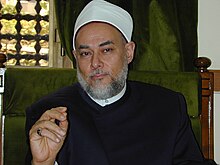Dr. Sheikh Ali Gomaa | |
|---|---|
| علي جمعة | |
 Gomaa in 2004 | |
| Grand Mufti of Egypt | |
| In office 28 September 2003 – 11 February 2013 | |
| President | Hosni Mubarak Mohamed Hussein Tantawi (Acting (law)) Mohamed Morsi |
| Preceded by | Ahmed el-Tayeb |
| Succeeded by | Shawki Ibrahim Abdel-Karim Allam |
| Personal details | |
| Born | 3 March 1952 Beni Suef, Egypt |
| Alma mater | Al-Azhar University (B.A.) (M.A.) (P.H.D.) Ain Shams University (B.Com.) University of Liverpool (H.D.) |
| Occupation | Islamic scholar |
| Website | draligomaa |
| Personal | |
| Religion | Islam |
| Denomination | Sunni |
| Jurisprudence | Shafi'i |
| Creed | Ash'ari |
| Movement | Neo-Traditionalism[1] Modernism[2] |
Ali Gomaa[3] (Arabic: علي جمعة, Egyptian Arabic: [ˈʕæli ˈɡomʕæ]) is an Egyptian Islamic scholar, jurist, and public figure who has taken a number of controversial political stances.[4][5][6][7][8][9][10][11] He specializes in Islamic Legal Theory. He follows the Shafi`i school of Islamic jurisprudence[12] and the Ash'ari school of tenets of faith.[13][14] Gomaa is a Sufi.[15]
He served as the eighteenth Grand Mufti of Egypt (2003–2013) through Dar al-Ifta al-Misriyyah succeeding Ahmed el-Tayeb. He has, in the past, been considered a respected Islamic jurist, according to a 2008 U.S. News & World Report report[16] and The National,[17] and "a highly promoted champion of moderate Islam," according to The New Yorker.[18] However, in recent years Western academic observers have described him as a supporter of authoritarian forms of government.
He was succeeded as Grand Mufti by Shawki Ibrahim Abdel-Karim Allam in February 2013.
- ^ Sedgwick, Mark. "The Modernity of Neo-Traditionalist Islam." Muslim Subjectivities in Global Modernity. Brill, 2020. 121-146.
- ^ Martin, Gianstefano C. The Dhimmi Narrative: A Comparison between the Historical and the Actual in the Context of Christian-Muslim Relations in Modern Egypt. NAVAL POSTGRADUATE SCHOOL MONTEREY CA DEPT OF NATIONAL SECURITY AFFAIRS, 2009. "Ali Gomaa, the Grand Mufti of Egypt and a modernist prefers to focus on the spirit of the law..."
- ^ Ethar El-Katatney The People's Mufti Archived 18 January 2008 at the Wayback Machine Egypt Today October 2007.
- ^ Kirkpatrick, David D. (25 August 2013). "Egypt Military Enlists Religion to Quell Ranks". The New York Times. Retrieved 10 September 2019.
- ^ Fadel, Mohammad (1 January 2016). "Islamic Law and Constitution-Making: The Authoritarian Temptation and the Arab Spring". Osgoode Hall Law Journal. 53 (2): 472–507. ISSN 0030-6185.
- ^ Cite error: The named reference
:2was invoked but never defined (see the help page). - ^ Cite error: The named reference
:3was invoked but never defined (see the help page). - ^ Dorsey, James (21 June 2019). "Al-Azhar Struggles to Balance Politics and Tradition". LobeLog. Retrieved 6 October 2019.
- ^ "Ali Gumah: Sisi's most loyal Islamic scholar". Middle East Eye. Retrieved 6 October 2019.
- ^ Elmasry, Mohamad (27 June 2015). "Ali Gumah: Sisi's most loyal Islamic scholar". Middle East Eye. Retrieved 6 October 2019.
- ^ "Ali Gomaa: Kill them, they stink". Middle East Monitor. 27 January 2014. Retrieved 6 October 2019.
- ^ Asthana, N. C.; Nirmal, Anjali (2009). Urban Terrorism: Myths and Realities. Pointer Publishers. p. 117. ISBN 978-8171325986.
- ^ Maged, Amani (3 November 2011). "Salafis vs Sufis". Al-Ahram Weekly Online. Archived from the original on 1 April 2015. Retrieved 17 December 2014.
- ^ el-Beheri, Ahmed (9 May 2010). "Azhar sheikh warns West against double standards". Egypt Independent. Retrieved 17 December 2014.
- ^ Islamopedia: "Ali Goma" Archived 8 November 2014 at the Wayback Machine retrieved 20 January 2015
- ^ Jay Tolson (2 April 2008). "Finding the Voices of Moderate Islam". U.S. News & World Report. Archived from the original on 11 April 2009. Retrieved 24 August 2017.
- ^ al-Hashemi, Bushra Alkaff; Rym Ghaza (February 2012). "Grand Mufti calls for dialogue about the internet". The National. Archived from the original on 21 February 2012. Retrieved 21 February 2012.
- ^ "The Rebellion Within". The New Yorker. 2 June 2008.